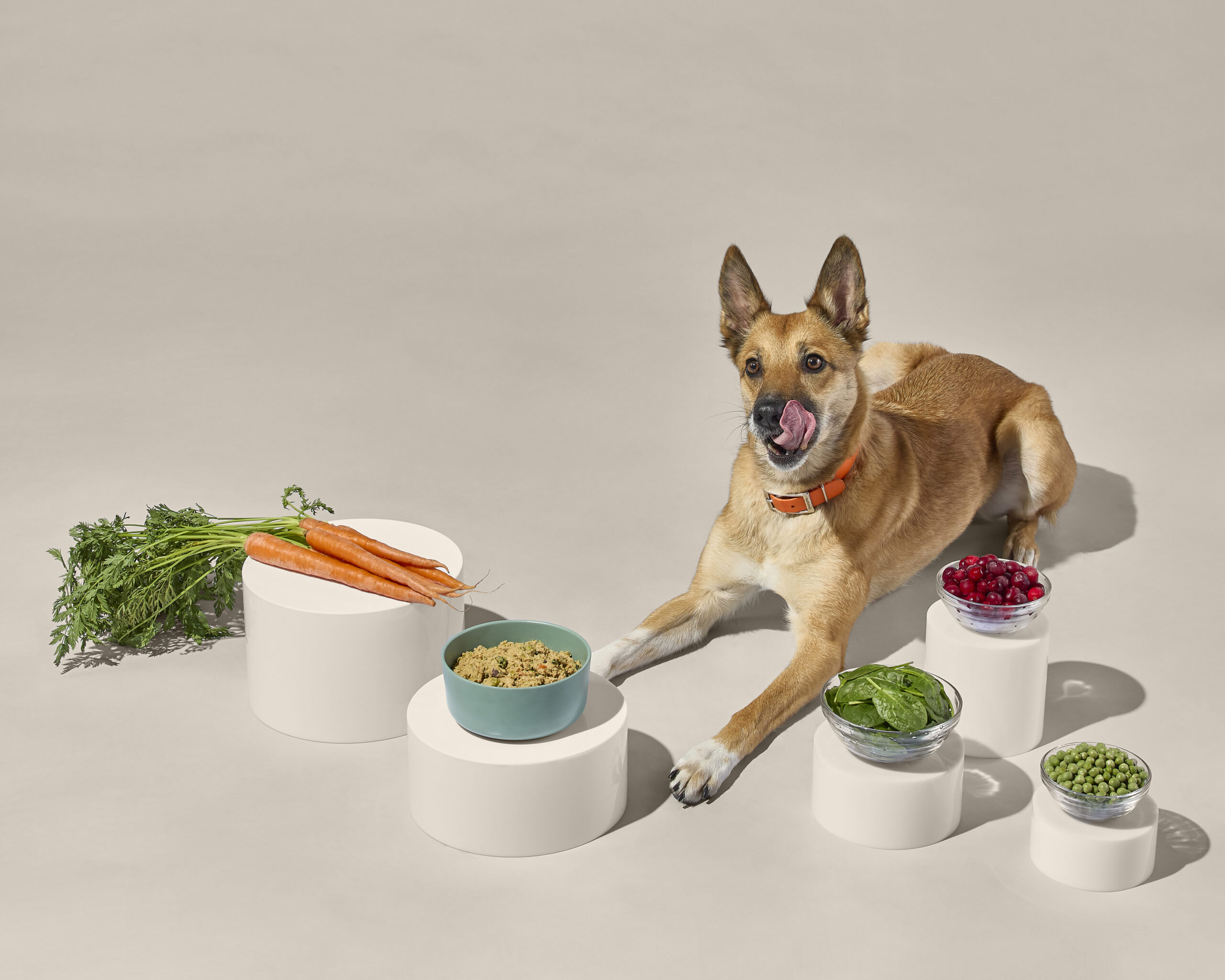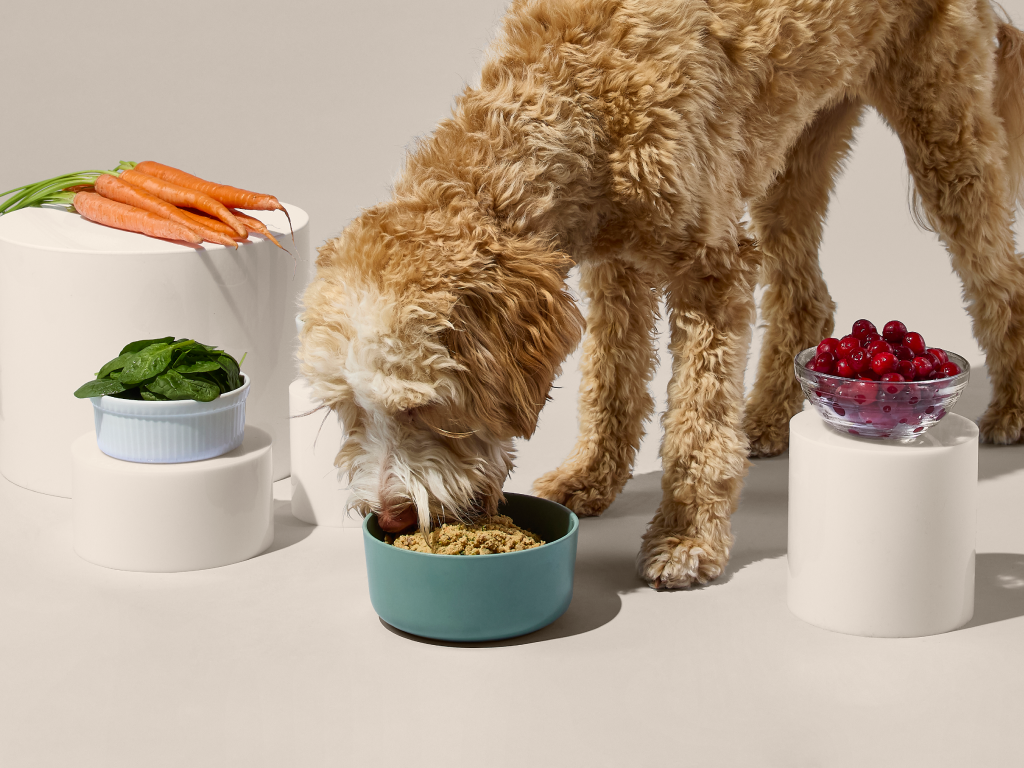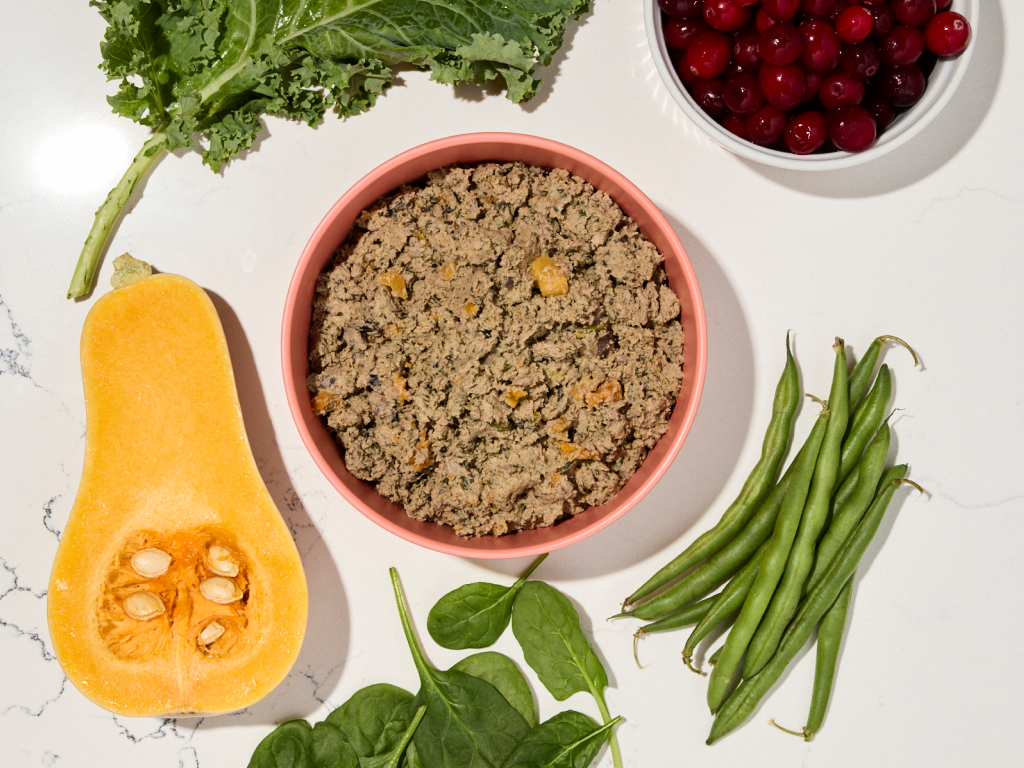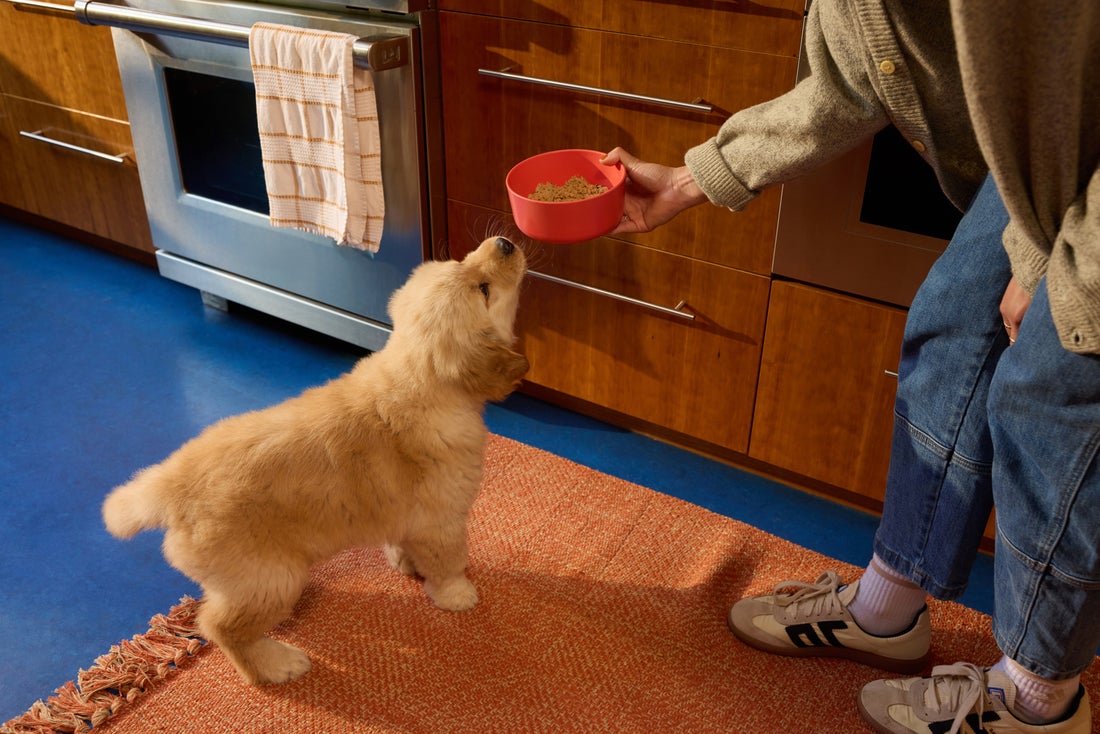Hey Ollie blog readers! We’re offering you an exclusive 60% OFF your starter box! Try now!
With vomiting, diarrhea or loose stools, excessive gas, lack of appetite, no pup parent enjoys seeing their dog struggle through the effects of a sensitive stomach. While finding the best food for your dog’s sensitive stomach can feel overwhelming, we’ve got you covered with the guidance you need to set your pup up for mealtime success. Let’s explore what causes digestive sensitivities and, more importantly, how to find relief for your dog.
Understanding Your Dog’s Sensitive Stomach
Some dogs are sensitive or even allergic to certain proteins, like chicken or beef. Another possibility is that your dog’s diet is lacking something, like fiber, vitamins, or minerals. It could even contain too much of something, like fat.
If you haven’t already consulted with your vet about your dog’s sensitive stomach, start there. You want to rule out any serious health condition before you start experimenting with different dog foods on your own.
Sometimes what looks like a simple food sensitivity can actually signal something more serious that needs medical attention. Because diarrhea, vomiting, and gas can indicate potentially serious health conditions, you’ll want your veterinarian to examine your dog to rule out other possible medical reasons for your dog’s symptoms before assuming they simply have a sensitive stomach.
What Causes Digestive Sensitivities?
The culprits behind your dog’s tummy troubles can vary widely. One of the main causes of a sensitive stomach in dogs is caused by sudden diet changes. Switching foods too quickly can upset a dog’s digestive system, so it’s important to make the transition slowly.
These elements could be a possible cause of higher digestive sensitivity in large-breed dogs. Interestingly, some breeds are more prone to food intolerances, too, including German Shepherds and Great Danes. This is due to genetic predispositions or structural issues in their gastrointestinal system.
And sometimes, it’s not even their main meals causing the problem. If your dog has a habit of getting into the trash, or if your dog eats a lot of treats and table scraps, something other than their dog food could be causing their upset stomach.

Key Ingredients to Look For in the Best Dog Food for Sensitive Stomachs
When you’re shopping for dog food to ease digestive sensitivities, focus on these stomach-friendly ingredients:
High-Quality, Easily Digestible Proteins
Dog foods made from high-quality ingredients tend to be much more digestible than those made from lower-quality ingredients. Look for single-source proteins like chicken, turkey, or lamb that are gentle on your dog’s system while providing essential amino acids.
Limited Ingredient Diets (LIDs)
Limited ingredient diets are dog foods that contain fewer components, which can help you pin down the specific ingredient your pup may be sensitive to.
When selecting food for a dog with an irritable digestive system, it’s helpful to choose dishes with fewer ingredients. A limited-ingredient food makes it easier to identify and avoid potential triggers.
Probiotics and Prebiotics for Gut Health
Prebiotics and probiotics to support healthy digestion. These beneficial microorganisms help maintain a healthy balance of gut bacteria, which can improve digestion and reduce gastrointestinal issues.
Gentle Carbohydrates
Rice or oatmeal as easily digestible carbohydrate sources. Oatmeal is a common ingredient in bland diets for dogs with sensitive stomachs, as it’s highly digestible, gentle on the digestive system, and contains natural prebiotic fibers.
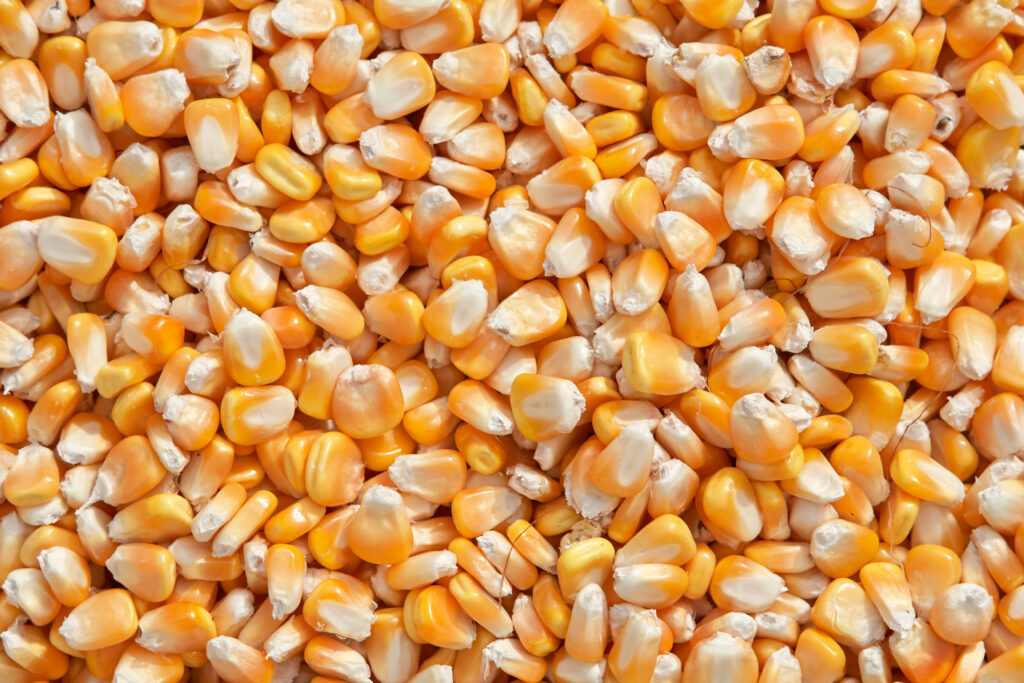
Ingredients to Avoid for Sensitive Stomachs
Just as important as knowing what to include is understanding what to steer clear of:
Common Problem Ingredients
- Artificial additives and preservatives: Artificial additives and preservatives like BHA, BHT, and ethoxyquin. These chemical preservatives can irritate a dog’s sensitive stomach and should be avoided.
- Hard-to-digest fillers: Fillers such as corn, soy, and wheat can be harder to digest. Grains, including wheat, corn, and soy, are popular fillers in dog food and can be difficult to digest.
- High-fat content: High-fat content can lead to digestive upset. Generally speaking, dietary fat is more complex and difficult for dogs to digest than carbohydrates and protein. Undigested fat that reaches the large intestine can be fermented by bacteria and contribute to diarrhea.
- Dairy products: Dairy products can be difficult for some dogs to digest. Most dogs are lactose intolerant, and dairy can lead to gastrointestinal upsets like gas and diarrhea.
Why Fresh Food Makes a Difference
We believe a dog’s health, happiness, and longevity begin with their food. We also believe superior ingredients and cooking techniques lead to the best nutrition. With the guidance of top pet health authorities, we craft clean, healthy recipes made from simple ingredients in human-grade kitchens.
Ollie delivers fresh, healthy dog food made with real, human-grade ingredients, tailored to your pup’s unique nutritional needs. Each recipe is crafted specifically to meet your dog’s nutritional needs, using whole meats, fruits, vegetables, and grains that are gentle on sensitive systems.
The end result is delicious, nutritious meals that dogs love and you can feel good about. Every Ollie recipe is packed with quality protein, fruit, vegetables, and grains, carefully chosen to bring out the best in your pup.
Making the Transition Safely
How you switch foods matters just as much as what you switch to. While it is tempting to start your dog on a new food immediately, it’s important to slowly transition your dog off of their old food and onto the new. If you don’t, you could end up worsening your dog’s sensitive stomach, or your dog could refuse to eat the new food.
Mix increasing amounts of your pet’s new food with decreasing amounts of the old food over a 7-day period. Start with about 75% old food and 25% new food for the first few days, then gradually shift the ratio until you’re feeding 100% of the new food. Your dog’s digestive system will thank you for taking it slow.
Supporting Your Dog’s Digestive Health Beyond Food
While finding the right food is crucial, there are other steps you can take to support your dog’s sensitive stomach:
Maintain a Consistent Routine
Regular feeding schedule: This helps regulate digestion. Dogs thrive on routine, and their digestive systems do too. Try to feed your dog at the same time each day.
Keep Them Hydrated
Adequate hydration: This ensures your dog always has access to fresh water. Fresh water should always be available, especially for dogs dealing with digestive issues.
Exercise Regularly
Regular exercise: This promotes healthy digestion. A daily walk or play session can help keep everything moving through your dog’s digestive tract.
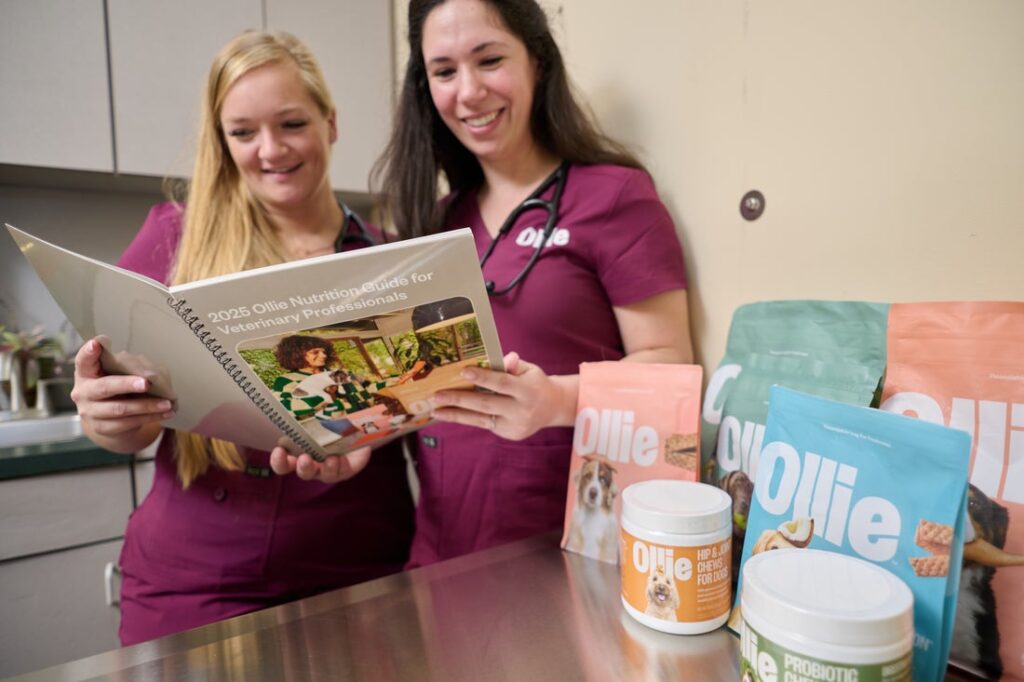
Working with Your Veterinarian
The best place to start your research is with your veterinarian or a veterinary nutritionist. Your vet might suggest a few brands of dog food that they prefer, and can give you an idea of problematic ingredients for your dog.
A certified veterinarian can determine if a dietary change is appropriate for your dog. Veterinarians may recommend prescription dog food, potentially through a 4-12 week food trial, or advise you on which ingredients to avoid moving forward.
Your vet is your best ally in this process. They can help rule out underlying health issues and guide you toward the most appropriate diet for your specific dog.
Why Choose Ollie for Your Dog’s Sensitive Stomach
Ollie’s approach to dog nutrition addresses many of the key factors we’ve discussed:
- Human-grade ingredients: Fresh, whole foods without artificial preservatives or hard-to-digest fillers
- Veterinary formulation: Developed with veterinary nutritionists, complete and balanced recipes, customized meal plans
- Gentle cooking process: Maintains nutritional integrity while ensuring digestibility
- Flexible delivery: Convenient weekly delivery options that fit your schedule
Ready to give your dog the gentle nutrition they deserve? Consider trying Ollie’s fresh dog food. Your dog’s stomach (and overall health) will thank you for it. Our customizable meal plans offer flexibility to match your budget while providing the high-quality nutrition your sensitive dog needs.
Frequently Asked Questions
How long does it take to see improvement in my dog’s sensitive stomach?
Finding the optimal diet for your dog’s sensitive stomach often takes time. Most dogs show signs of improvement within 2-4 weeks of switching to an appropriate diet. However, every dog is different, and some may see changes sooner while others might need a bit more time.
Can I give my dog probiotics along with their new food?
Yes, probiotics can be beneficial for dogs with sensitive stomachs. Beyond dietary adjustments, your dog may also require additional products to support their digestive health. Always consult with your veterinarian before adding supplements to your dog’s routine.
What should I do if my dog’s symptoms persist after changing their food?
If your dog shows persistent signs of a sensitive stomach, consult a veterinarian to identify the underlying cause and develop a suitable dietary or medical plan. Persistent symptoms might indicate an underlying condition that needs medical attention.
Are grain-free diets better for dogs with sensitive stomachs?
Not necessarily. The key is finding easily digestible carbohydrate sources rather than avoiding grains entirely. Rice and oats can actually be excellent choices for sensitive stomachs due to their digestibility.
How do I know if my dog has a food allergy versus a food sensitivity?
If your veterinarian thinks your dog has a true food allergy, they will recommend a guided elimination diet trial to identify the specific allergen. Dogs with true food allergies should be fed therapeutic veterinary diets that have strict manufacturing standards to prevent cross-contamination; dogs who experience less severe sensitivities to certain ingredients might see symptoms improve with a non-prescription diet.
Finding the best dog food for sensitive stomachs doesn’t have to be overwhelming. With the right ingredients, a gradual transition, and perhaps most importantly, a commitment to quality nutrition like what Ollie provides, you can help your dog feel their best again.
Tagged As:

The nutrition your dog needs,
the food they want.

Enjoying our articles? Subscribe our Newsletters and get new articles directly to your inbox
You might also like
29 September 2025
6 MINS READ
How Is Fresh Dog Food Made?
Unlike standard kibble that undergoes high-heat processing, fresh dog food maintains the natural integrity of ingredients while avoiding artificial additives and fillers. But what exactly goes int…
by Ollie Pets
29 September 2025
7 MINS READ
Is Lamb a Good Protein for Sensitive Stomachs?
Lamb provides significant nutritional benefits for dogs, particularly for pups with sensitive stomachs who need a specialized diet. This protein-rich meat offers an excellent alternative for pups …
by Ollie Pets
29 September 2025
7 MINS READ
Top 10 Fresh Ingredients for Your New Puppy’s Bowl
As dog parents, we naturally want to provide our pups with a strong start in life. This means giving them nutrition that is able to support their rapid growth, abundant energy, and developing immu…
by Ollie Pets
